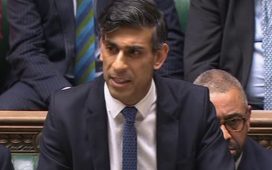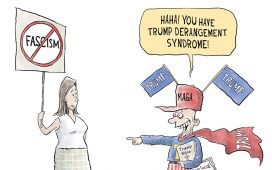Even by Mike Ashley’s standards, Sport’s Direct’s annual results statement on Friday was an extraordinary performance. The idiosyncratic billionaire’s comments included expressing regret about buying House of Fraser last year due to its “terminal” problems; urging the City regulator to offer voluntary drugs tests to the chief executives of listed businesses; revealing that none of the big four auditors are able or willing to work with Sports Direct; and railing at length over the circumstances of his company’s failed bid for control of Debenhams. Oh, and there will be no profit guidance for next year.
The coup de grace, the show-stopper, came at the end: an unresolved €674m (£605m) tax bill from the Belgian authorities. The final paragraph of the results came out of the blue and will almost certainly trigger a punitive response from investors on Monday and, in the medium term, an attempt to punish the company’s board.
Sports Direct said it would address the tax issue but Chris Wootton, the deputy finance director, acknowledged that Grant Thornton, Sports Direct’s auditor, needed convincing. Given the tax bill arrived 24 hours before the results were published, this asks questions of the power dynamic between Grant Thornton and Sports Direct. How convinced were they that the Belgian taxman – wielding a bill that represents several years’ worth of group profits – didn’t pose a material threat to the group?
Ashley owns 62% of the business and the 38% rump of minority shareholders will want to know whether chairman David Daly and his non-executive directors saw the tax bill coming. Indeed, they might request that an independent adviser hover over Ashley’s laptop the next time he bashes out a statement.
Friday’s performance showed a retail group in trouble. It has bought too many businesses (Evans Cycles, sofa.com, Game Digital and House of Fraser have been acquired since 2018), it is struggling to keep some retail brands onside, and it is losing key executives at too fast a rate. Karen Byers, a key lieutenant, quit this month and, on Friday, Sports Direct announced the departure of its finance director. As the sprawling statement showed, now is not the time for Ashley to be losing experienced senior managers.
Friday’s farce was quintessential Ashley – compelling, wilful, excruciating – but it was neither typical nor becoming of a listed business, and that points to where the future might lie for Sports Direct’s founder and chief executive.
Despite his protestations to the contrary last week, Ashley must be considering taking the business private and probably has the liquidity and contacts to make it happen. A business that was worth more than 800p a share at its peak in 2014 is worth 230p, or £1.2bn, now. It is also likely to be cheaper by the end of this week.
Even if Sports Direct disappears from publicly listed life, the business remains a matter of national importance. House of Fraser, which accounts for at least 10,000 jobs on the British high street, should not be allowed to fail and at some point an ailing retail name will have to become a test of government resolve to help the industry.
The department store’s problems are shared by healthier businesses: stifling business rates, a benign tax environment for online rivals, and the lack of a properly funded government retail strategy. House of Fraser’s predicament is serious and will almost certainly become a test of the government’s ability to do something constructive about the state of the high street amid Brexit. Last week, the CBI said Britain’s retailers had recorded the longest period of falling sales for almost eight years, while at least 75,000 retail jobs have been lost since last year. Action is needed.
Nonetheless, Ashley should not be spared judgment. Sports Direct’s misery is entirely self-made, due to an unrestrained chief executive whose ambition and belief in his own abilities as a retailer have got the better of him. Staff and shareholders will now pay the price.
The Cobham sale shows crashing out could spark a buyout frenzy
Last week’s £4bn agreed deal to sell Cobham to US private equity firm Advent International could be a sign of things to come for British companies.
Private equity firms raise cash from investors and buy companies that appear undervalued, using lots of debt. They then cut costs and, sometimes, make improvements before offloading the business, either in chunks or in one piece – often back to the shareholders who sold in the first place.
The firms, once vilified as asset-stripping marauders, slipped out of view after the financial crisis. But, armed with a record $2.5tn (£2tn) of funds and able to tap abundant cheap debt, they are on the march again. The value of buyouts reached a record $256bn in the first half of this year.
Britain has slipped down the list of countries for acquisition targets as Brexit has clouded companies’ prospects. But there is a price for any risk and we may have reached that level.
The pound has fallen by about 17% against the dollar since the referendum, making UK companies relatively cheap for US buyers. The UK government also tends not to get involved in takeovers, reducing the hassle and risks found in other countries.
After the vote, Advent continued buying up UK industrial companies such as Laird and Brammer. The £4bn price for Cobham is its biggest bet on the UK and it has $17.5bn of funds waiting for deals. Other outfits are also taking the plunge: Blackstone, the world’s biggest private equity firm, is one of three investors buying Merlin Entertainments, the owner of Madame Tussauds.
If the pound collapses after a no-deal Brexit, UK firms will become even cheaper for buyers should they have the stomach for it.
A buyout frenzy would raise questions for the new government. Will it seek favour with the US and preside over anything-goes capitalism? Or does it come under pressure to live up to its nationalist rhetoric and intervene?
Just what Britain didn’t need – a Trump-led global slowdown
Ever since Donald Trump kicked off a trade war last year, the stability of the world economy has looked in jeopardy. Import and export activity has slumped, and with it global economic growth. Business confidence has evaporated and investment frozen.
This week, the US Federal Reserve will be tasked with picking up the pieces, and international markets are braced for the central bank to cut borrowing costs to support growth at home and abroad. Without such a step, the whole apple cart of the world economy could tumble.
City economists expect the Fed to cut interest rates by a quarter of a point on 31 July, to between 2% and 2.25%, marking the first reduction in borrowing costs in a decade.
Central banks elsewhere have been backed into a corner by Trump’s bullying tactics. The president’s trade wars are having a chilling effect on the European economy, where manufacturers reliant on healthy export volumes are in the doldrums. The European Central Bank dropped the broadest hint yet last week that it would join the Fed by cutting interest rates to support faltering economic activity.
Presented with the unique challenge of Brexit alongside this slowdown, the Bank of England, too, looks more likely to cut rates than it might have done earlier this year. Threadneedle Street is expected to leave interest rates unchanged at 0.75% until the outcome of Brexit has been determined. Crashing out without a deal this autumn would almost certainly see a cut in borrowing costs. Weaker global growth just as Britain severs itself from the EU, its biggest trading partner, would confirm such a prescription.
Bank of England governor Mark Carney will provide an economic update on Thursday with the publication of the MPC’s quarterly inflation report. Looming Brexit and Trump’s trade war will have an impact. And after the elevation of the “British Trump”, Boris Johnson, to No 10, economic news in the UK is unlikely to look any rosier.













